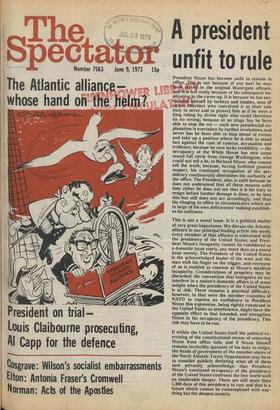President Nixon has become unfit to remain in offix.A '
not because of any part he may t( pi rr%rita 4 in the original Watergate offence, t( pi rr%rita 4 in the original Watergate offence, and It is ho really because of his subsequent im plication in the cover-up. It is because he has sur rbunOd .himself by lackeys and toadies, men of , strawttleMirtiers who conceived it as their sole duty to serve and to protect him as if he were a king ruling by divine right who could therefore do no wrong; because at no stage has he been able to stop the rot — each new presidential explanation is overtaken by further revelations, and never has he been able to leap ahead of events and take up a position where he is able to stand fast against the rush of rumour, accusation and evidence; because he now lacks credibility — the occupancy of the White House has now come round full circle from George Washington, who could not tell a lie, to Richard Nixon, who cannot tell the truth; because, having forfeited general respect, his continued occupation of the presidency continuously diminishes the authority of the office. The President, also, is unfit because he does not understand that all these reasons unfit him: either he does not see that it is his duty to resign before further damage is done, or he sees this but still does not act accordingly, and thus his clinging to office in circumstances which are in large of his own deficiencies' making establishes his unfitness.
This is not a moral issue. It is a political matter of very great importance. We discuss the Atlantic alliance in our principal leading article this week; every member of that alliance is concerned with the presidency of the United States; and President Nixon's incapacity cannot be considered as a domestic issue solely, any more than as a moral issue merely. The President of the United States is the acknowledged leader of the west and the man with his finger on the trigger, and everyone of us is entitled to concern at Nixon's manifest incapacity. Considerations of propriety may be discarded: the convention that foreigners do not interfere in a nation's domestic affairs is of scant weight when the presidency of the United States Is at risk. There remains a practical difficulty, however, in that were the member countries of NATO to express no confidence in President Nixon this expression, being rightly construed in the United States as interference, might have the opposite effect to that intended, and strengthen Nixon in his occupancy of the presidency. This risk may have to be run.
If within the United States itself the political exercising of the constitutional means of removing Nixon from office fails, and if Nixon himself remains invincibly ignorant of his duty to resign, the heads of government of the member-states of the North Atlantic Treaty Organisation may have to consider publicly declaring what all of them now privately acknowledge: that President Nixon's continued occupancy of the presidency of the United States confronts the free world with an intolerable danger. There are still more than 1,300 days of this presidency to run: and that is a future which cannot be contemplated with anything but the deepest anxiety.


































